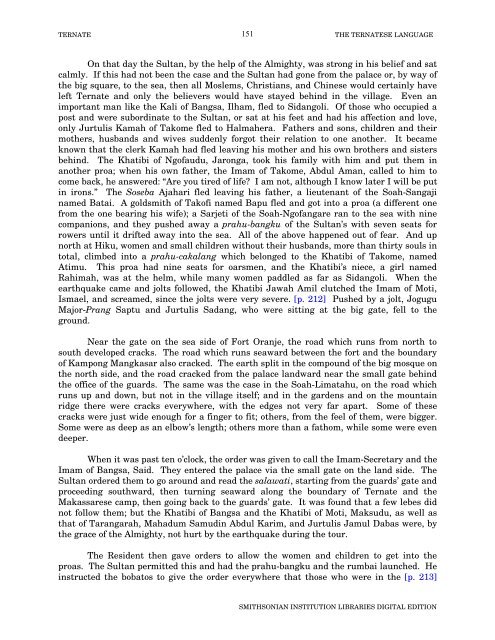Ternate - Smithsonian Institution Libraries
Ternate - Smithsonian Institution Libraries
Ternate - Smithsonian Institution Libraries
You also want an ePaper? Increase the reach of your titles
YUMPU automatically turns print PDFs into web optimized ePapers that Google loves.
TERNATE 151<br />
THE TERNATESE LANGUAGE<br />
On that day the Sultan, by the help of the Almighty, was strong in his belief and sat<br />
calmly. If this had not been the case and the Sultan had gone from the palace or, by way of<br />
the big square, to the sea, then all Moslems, Christians, and Chinese would certainly have<br />
left <strong>Ternate</strong> and only the believers would have stayed behind in the village. Even an<br />
important man like the Kali of Bangsa, Ilham, fled to Sidangoli. Of those who occupied a<br />
post and were subordinate to the Sultan, or sat at his feet and had his affection and love,<br />
only Jurtulis Kamah of Takome fled to Halmahera. Fathers and sons, children and their<br />
mothers, husbands and wives suddenly forgot their relation to one another. It became<br />
known that the clerk Kamah had fled leaving his mother and his own brothers and sisters<br />
behind. The Khatibi of Ngofaudu, Jaronga, took his family with him and put them in<br />
another proa; when his own father, the Imam of Takome, Abdul Aman, called to him to<br />
come back, he answered: “Are you tired of life? I am not, although I know later I will be put<br />
in irons.” The Soseba Ajahari fled leaving his father, a lieutenant of the Soah-Sangaji<br />
named Batai. A goldsmith of Takofi named Bapu fled and got into a proa (a different one<br />
from the one bearing his wife); a Sarjeti of the Soah-Ngofangare ran to the sea with nine<br />
companions, and they pushed away a prahu-bangku of the Sultan’s with seven seats for<br />
rowers until it drifted away into the sea. All of the above happened out of fear. And up<br />
north at Hiku, women and small children without their husbands, more than thirty souls in<br />
total, climbed into a prahu-cakalang which belonged to the Khatibi of Takome, named<br />
Atimu. This proa had nine seats for oarsmen, and the Khatibi’s niece, a girl named<br />
Rahimah, was at the helm, while many women paddled as far as Sidangoli. When the<br />
earthquake came and jolts followed, the Khatibi Jawah Amil clutched the Imam of Moti,<br />
Ismael, and screamed, since the jolts were very severe. [p. 212] Pushed by a jolt, Jogugu<br />
Major-Prang Saptu and Jurtulis Sadang, who were sitting at the big gate, fell to the<br />
ground.<br />
Near the gate on the sea side of Fort Oranje, the road which runs from north to<br />
south developed cracks. The road which runs seaward between the fort and the boundary<br />
of Kampong Mangkasar also cracked. The earth split in the compound of the big mosque on<br />
the north side, and the road cracked from the palace landward near the small gate behind<br />
the office of the guards. The same was the case in the Soah-Limatahu, on the road which<br />
runs up and down, but not in the village itself; and in the gardens and on the mountain<br />
ridge there were cracks everywhere, with the edges not very far apart. Some of these<br />
cracks were just wide enough for a finger to fit; others, from the feel of them, were bigger.<br />
Some were as deep as an elbow’s length; others more than a fathom, while some were even<br />
deeper.<br />
When it was past ten o’clock, the order was given to call the Imam-Secretary and the<br />
Imam of Bangsa, Said. They entered the palace via the small gate on the land side. The<br />
Sultan ordered them to go around and read the salawati, starting from the guards’ gate and<br />
proceeding southward, then turning seaward along the boundary of <strong>Ternate</strong> and the<br />
Makassarese camp, then going back to the guards’ gate. It was found that a few lebes did<br />
not follow them; but the Khatibi of Bangsa and the Khatibi of Moti, Maksudu, as well as<br />
that of Tarangarah, Mahadum Samudin Abdul Karim, and Jurtulis Jamul Dabas were, by<br />
the grace of the Almighty, not hurt by the earthquake during the tour.<br />
The Resident then gave orders to allow the women and children to get into the<br />
proas. The Sultan permitted this and had the prahu-bangku and the rumbai launched. He<br />
instructed the bobatos to give the order everywhere that those who were in the [p. 213]<br />
SMITHSONIAN INSTITUTION LIBRARIES DIGITAL EDITION

















